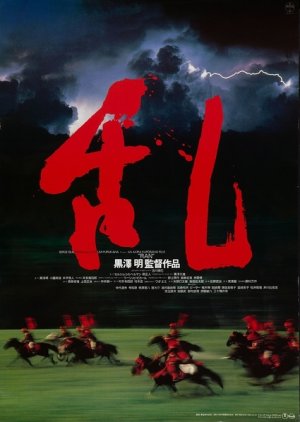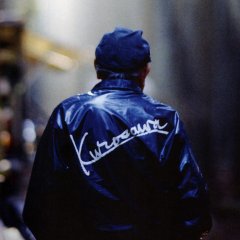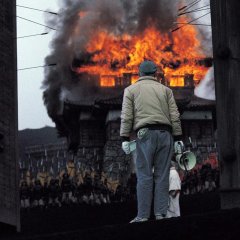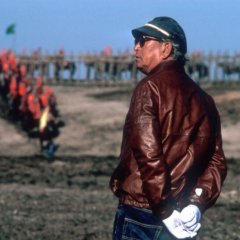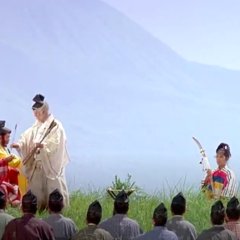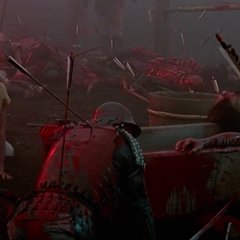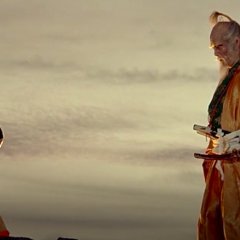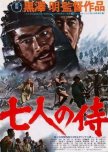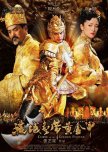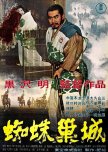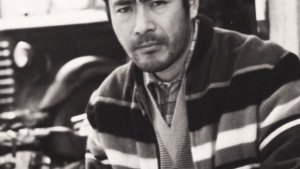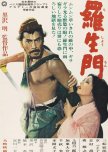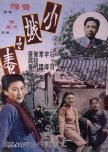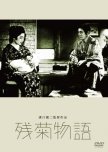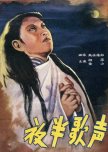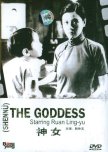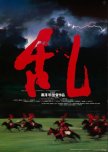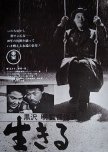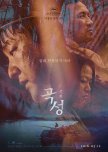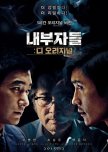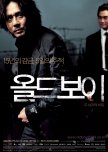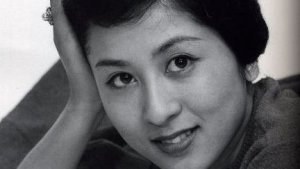 An Ultra Fan's Guide to Kagawa Kyoko
An Ultra Fan's Guide to Kagawa Kyoko A story of greed, a lust for power, and ultimate revenge. The Great Lord Hidetora Ichimonji has decided to step aside to make room for the younger blood of his three sons, Taro, Jiro, and Saburo, the Lord's only wish now being to live out his years as an honored guest in the castle of each of his sons in turn. While the older two sons flatter their father, the youngest son attempts to warn him of the folly of expecting the three sons to remain united; enraged at the younger son's attempt to point out the danger, the father banishes him. True to the younger son's warning, however, the oldest son soon conspires with the second son to strip The Great Lord of everything, even his title. (Source: IMDb) Edit Translation
- English
- 中文(台灣)
- Español
- magyar / magyar nyelv
- Native Title: 乱
- Also Known As: Chaos , Revolt ,
- Screenwriter & Director: Kurosawa Akira
- Genres: Action, Historical, Drama, War
Cast & Credits
- Terao Akira Main Role
- Harada Mieko Main Role
- Nakadai Tatsuya Main Role
- Igawa HisashiKurogane ShuriSupport Role
- Ueki HitoshiNobuhiro FujimakiSupport Role
- Nomura Mansai IITsurumaruSupport Role
Reviews

The plot is based on Shakespeare's "King Lear" and tells the story of Lord Hidetora Ichimonji, who decides to pass on his power and empire to his oldest son after deciding to retire. The division of power between the sons eventually leads to chaos.
However, the storytelling is far from chaotic. The film has many themes such as of greed, power, hatred, revenge, lust, guilt etc. and yet, Kurosawa manages to create a perfect balance between them. This could have been a messy experience but there is no doubt why Ran is considered a masterpiece. Kurosawa did not only adapt the work of Shakespeare but made it his own.
You cannot watch this film without noticing the cinematography. At times, I think about the fact that Kurosawa spent his filmmaking career making movies in black and white and yet he was able to use color to create such a breathtaking visual experience where color plays an important role in the storytelling, such as differentiating the characters and clans. The long shots and the vast landscapes, everything is carefully planned. The action sequences as well are mind-blowing, well choreographed and just heart pounding. It is incredible to look at, to say the least.
To talk about the acting, the entire cast shows strong performances that are hard to to forget. Especially Nakadai Tatsuya as the elderly warlord Hidetora Ichimonji. He is a great and extremely convincing actor and his portrayal of his character here did not fall short in any way, it was incredible. My personal favorite performance however was by Harada Mieko as Lady Kaede. This character is someone that I think you are supposed to despise but in my personal opinion, her actions are well motivated. The way she is turning a tragedy to her advantage and systematically manipulates, I was in awe.
If I had to point out only ONE thing that could be seen as negative for some, is that it is slow paced, especially in the first act. However, I think everyone should give this film a chance. It is one of the best, if not THE best historical epic ever created.

"In a mad world, only the mad are sane"
One of the meanings for Ran in Japanese is "chaos". You know when you are about to watch a film by Kurosawa based on Shakespeare's "King Lear" you are going to experience a theatrical marvel, chaos, and a boat load of pain. Kurosawa used all of his skills to bring to life the story of a king driven mad by his traitorous children. At 75, his directorial skills were far from obsolete. He made a stunningly beautiful and heartbreaking tragic epic in a manner only he could do.Hidetora who had unified his region through fire and the sword and an utter lack of mercy announces that he is ready to retire. Taro, his eldest son, flatters him feigning humility when Hidetora bequeaths the title to him. He gives the two other sons, Jiro and Saburo their own castles, confident that his actions will bring lasting peace to the valley. Far from a sycophantic speech to his father, Saburo, the only son who loves him, tells him the plan will never work as does the court jester. Saburo and Hidetora's loyal retainer, Tango, are both banished for speaking the truth. It doesn't take long for Hidetora to realize his youngest son was right. Taro, at the bequest of his wife, Lady Kaede, humiliates his father by forcing him to sign a pledge of loyalty and into handing over the title Hidetora had sought to retain. Hidetora travels to Jiro's castle but finds no welcome from his middle son. Upon hearing the third castle is empty he and his entourage seek shelter there only to fall into a trap. Taro and Jiro join hands to destroy their father. After every last man and woman loyal to Hidetora is killed trying to protect their lord, Taro is "accidentally" killed, and his father is allowed to walk out of the burning keep, his mind completely broken. For all of the victories in his life, he could not see the evil his sons had harbored in their hearts and that evil would bring all he'd fought for and attained to naught.
***Warning! 417 year old spoiler ahead in the next paragraph!!!***
As Hidetora wanders aimlessly, his jester and Tango find him and care for him. Lady Kaede seduces Jiro and orders him to have his gentle wife, Sue, murdered. When Saburo comes to find his father, Lady Kaede incites Jiro to attack Saburo's men after agreeing to a truce. Saburo finds his disturbed father in a rocky "grave". Saburo's forgiveness clears Hidetora's mind and they dream of telling tales and living together. Jiro's man kills Saburo and Hidetora loses all hope and dies next to him. Like in King Lear, the family was extinguished. Saburo's men and allies triumphantly kill Jiro and his men laying waste to the last of Hidetora's family.
Much like King Lear, Ran ended with the tragic and inevitable loss of life based on a father's bloody past, pride, and blindness to the truth. Hidetora was haunted by all those he'd killed, including the families of his daughters-in-law. Unable to escape the ghosts of his cruel actions, Hidetora and his jester were forced to take refuge among the rubble of the keep he'd burned, at one time spending the night in the hut of a man he'd blinded. His jester ever speaking the truth and folly of his actions. There were no heroes in this film. Hidetora had blood on his hands. Jiro and Taro were murderous and duplicitous. Although Lady Kaede was widely hated, her vengeful actions, with the exception of her hatred of the Lady Sue, were understandable. Only Saburo who spoke the truth perhaps had a vision for a better tomorrow and he ended up paying for his father's sins.
At times, Kurosawa showed the chaos of battle in a beautiful manner with soldiers racing across fields and in castle keeps, silently except for the haunting music. Just as quickly the exquisitely orchestrated military dances devolved into the brutality of war with bodies filled with arrows, severed limbs, and crimson blood dripping ceilings. Fire and smoke choked out all sanity and peace. At one point, Hidetora wondered if he was in hell. He was in hell, a hell of his own making carved out by the carnage he had wrought during his life, the example his sons had learned from, pitting them against him and each other.
The opening scenery was gorgeous, vibrantly alive with verdant green hills. Kurosawa was truly a master of filling the screen with interesting movement and use of color. After the dye was set and the father gave his sons their inheritance, the windblown landscapes became dry and vast. As always, Kurosawa's fateful wind blew across the screen, tinged with either dust or smoke. Emi Wada won an Oscar for best costume design and it showed. The lifeless beige and gray backgrounds were the perfect contrast for her intricately and brilliantly hued costumes. The only detractor in this film for me was Nakadai's makeup. Much like the aging makeup on Mifune Toshiro in "I Want to Live", it was overly theatrical. The white and purple makeup obscured Nakadai's face and thus his unhinged performance.
Whether order was restored out of the familial chaos, is unknown. The film showed that confusion and disorder are always at the ready when truth is abandoned for what people pridefully want to hear. Children learn from what their parents do, not what they say, especially when their parent has been burning villages and castles to the ground in his desire to gain more. Hidetora made the classic mistake of thinking upon his retirement he had any say over what the next generation would do. Their desire for power was just as ravenous as his own had been-maybe more.
The message is timeless, whether in Shakespeare's day, Kurosawa's, or our own. As long as chaos bids us take what is not ours, view others as less than and disposable, we are bound to repeat the actions that bring sorrow instead of joy. The last character standing, blind atop a precipice, his painting of the Amida Buddha fallen and out of reach, reflected much of the mood of the film. The lust for power blinds men, their only hope for peace lost, ultimately leaving everything in ruins.
"It is the gods who weep. They see us killing each other over and over since time began…They can't save us from ourselves."
Ran was a gorgeous and enthralling film to watch and a cautionary tale as well.
6/28/23

